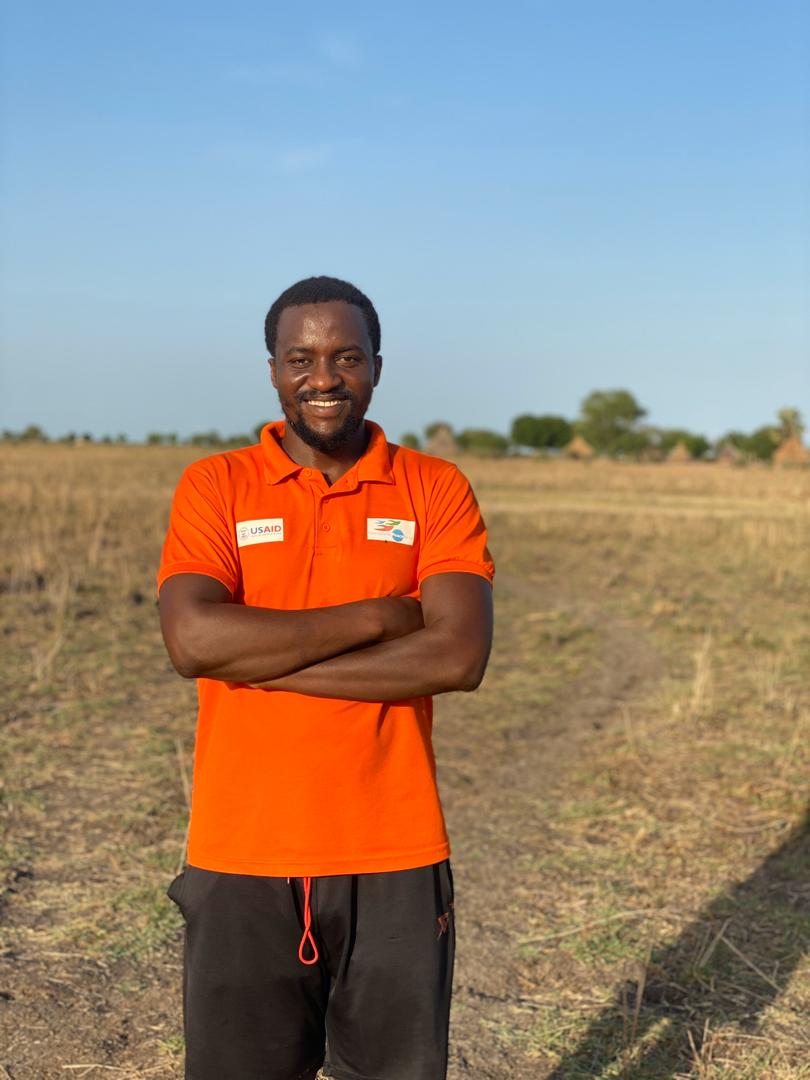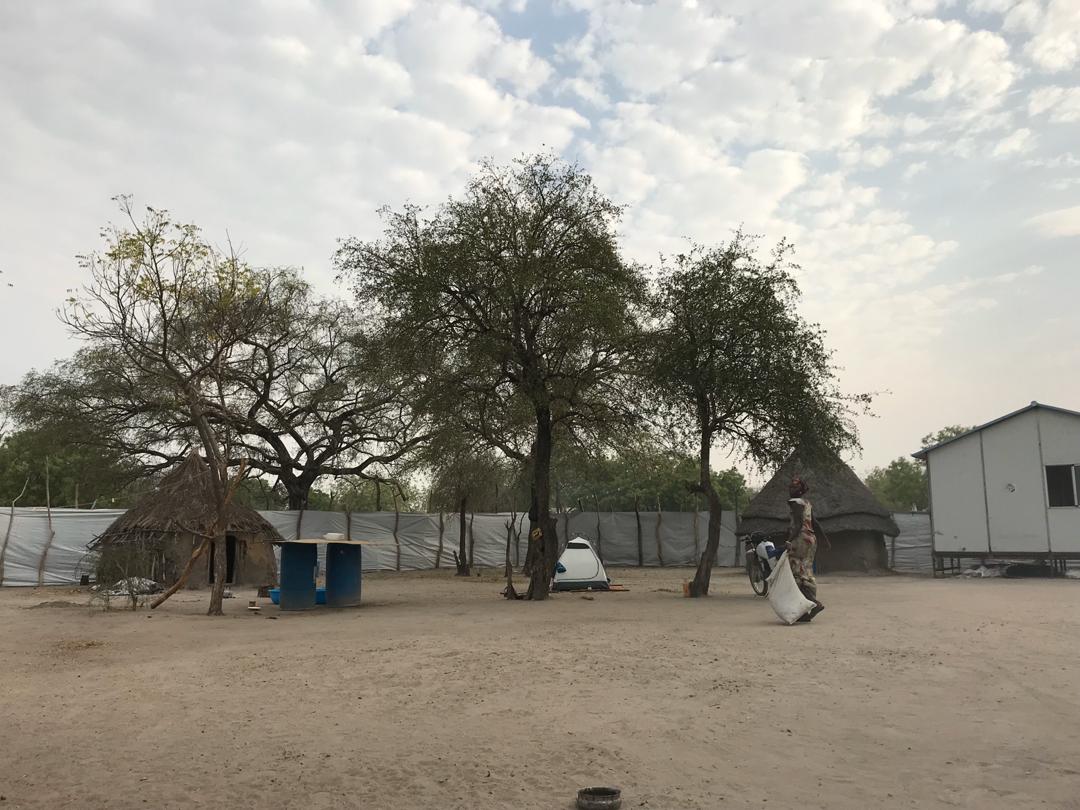From the field: Tanzania to South Sudan
By Frank Kessy
Frank, a Protection Officer from Tanzania, has been working with Nonviolent Peaceforce for years. While he is still currently working in South Sudan, the recent travel restrictions due to COVID-19 allowed Frank to reflect on his time in Lankien, South Sudan—where he spent almost one year building relationships with the local community.
 Frank and colleagues in Lankien. Left to right: William,
Frank and colleagues in Lankien. Left to right: William,
Frank, Lonny, Laura, and Deng (Feb 2018).
Lankien was both frustrating and fulfilling, both demanding and satisfying, and many times both a relief in running away from my normal pressures and a sinking feeling of the new set of pressures that come with working as a protection officer.
Lankien is in a remote area of South Sudan, a high-risk country for violence. Just two years after becoming an independent country, South Sudan entered into a civil war and has since been characterized by volatile governmental and non-governmental armed fractions that often have a go at each other.
 There were moments of calm, like a perfect bath in the morning in Lankien. The air was chilly, the crows were just waking up, there was some silence in the morning and the bathroom and latrine were still somewhat fresh. Then there was the hot cup of coffee; Nescafe had never been that delicious. I cannot forget the cold tukul (mud hut) at night. Don’t get me wrong, Lankien was unforgivingly hot during the day, unbearable even—but at night, it morphed into a wonderful chill, even cold on some nights.
There were moments of calm, like a perfect bath in the morning in Lankien. The air was chilly, the crows were just waking up, there was some silence in the morning and the bathroom and latrine were still somewhat fresh. Then there was the hot cup of coffee; Nescafe had never been that delicious. I cannot forget the cold tukul (mud hut) at night. Don’t get me wrong, Lankien was unforgivingly hot during the day, unbearable even—but at night, it morphed into a wonderful chill, even cold on some nights.
But the moments of calm were against the backdrop of civil war. Lankien was opposition controlled. Living and working there for a long time, I constantly heard a lot of propaganda against the enemy—even the music was about war. Sometimes I would be dancing with the youth, only later to realize I was dancing a music full of insults against their enemies. The majority of the songs were war songs and praise of local heroes and prophets.
There were many moments of violence. Many people had arrived in Lankien after fleeing violence in their own villages—they had lived through conflict for years. In South Sudan, the communities worry about the national conflict, cattle raiding, and clan violence. One month after my arrival, Lankien was attacked by an armed group that the locals associated with a neighboring tribe. That night we all felt like we were at the frontline. The village was attacked and there was also fighting outside the village. Almost one thousand cattle were stolen and thirty-two people were killed. The next day, the authorities were collecting the wounded and the dead. I have never seen so many dead people in my life. Our base was near the hospital and I could see both the dead and injured brought by old land cruisers—and so many injured that screamed for mending. Later, the wounded were taken by plane to a hospital in another state, since the hospital in Lankien was specialized for treating Malaria and black fever only.
And this violence was the reason that our team was there. We were there to protect people. Times were hard, but I was so happy to see the impact my team created. I loved working with people to make sure they had the tools to respond early to potential violence. This work was so relevant and helpful to both the community participants and our team.
We had trained some youth in Unarmed Civilian Protection. One day they showed up at base with the news that enemy forces would be attacking Lankien soon. But the youths’ training kicked in. Since we had done a risk mapping exercise with them as part of the training, they were able to make a plan to protect vulnerable people ahead of the attack—just like how they planned during one of our sessions. Although there were heavy clashes and drawn-out skirmishes, the youth were able to put a plan together ahead of time to protect the vulnerable.
We were also there to enhance the community’s self-protection. In Lankien, almost every man in the village had a gun. You could buy bullets at a shop in the market, which was a hotspot for violence. Three times in Lankien I was caught in crossfires at the market. The fights were between clans in the community, intercommunal violence that is common across South Sudan. During one of those crossfires, one of my colleagues from South Sudan helped to get me and others to safety, even though she was putting herself at risk. That same night, one of our colleagues had to flee and go into hiding since he was from the clan which had recently killed someone.
But prevention of violence is more effective than responding to violence. Our team held sessions on the danger of Small Arms and Light Weapons in order to promote weapon free zones, particularly at the market, since it was a hotspot of clan violence. The local authority listened to our team and the market was made a weapon free zone. The community was overjoyed at this change.
 The compound where Frank lived. From left to right
The compound where Frank lived. From left to right
is the kitchen and his tukul (mud hut).
I cannot forget the first time I left Lankien for Juba, the capital. As I embarked and the chopper started, everything in Lankien changed while looking down. The market was full of dust from the chopper and I could see familiar people waving. The five-hour flight to Juba somehow seemed to be a two-day flight. While in transit, I called my supervisor in Juba using my small phone that had been off for the past seventy-five days. I realized it felt weird being able to make a phone call. Having a small phone in Lankien felt useless due to the lack of signal, but on the other side of the country it’s suddenly useful again.
Flying low and looking at how resourceful this country is, I realized not everyone from Lankien and or elsewhere in South Sudan has such an opportunity to leave like I did several times to get a break. Just these small changes after leaving Lankien for my first break, like flying away and using a phone, made me truly appreciate how much more work there is to still do in this country.
* * *
Nonviolent Peaceforce’s work in Lankien, South Sudan is possible thanks to the support of the Office of U.S. Foreign Disaster Assistance (OFDA) and generous supporters like you.
